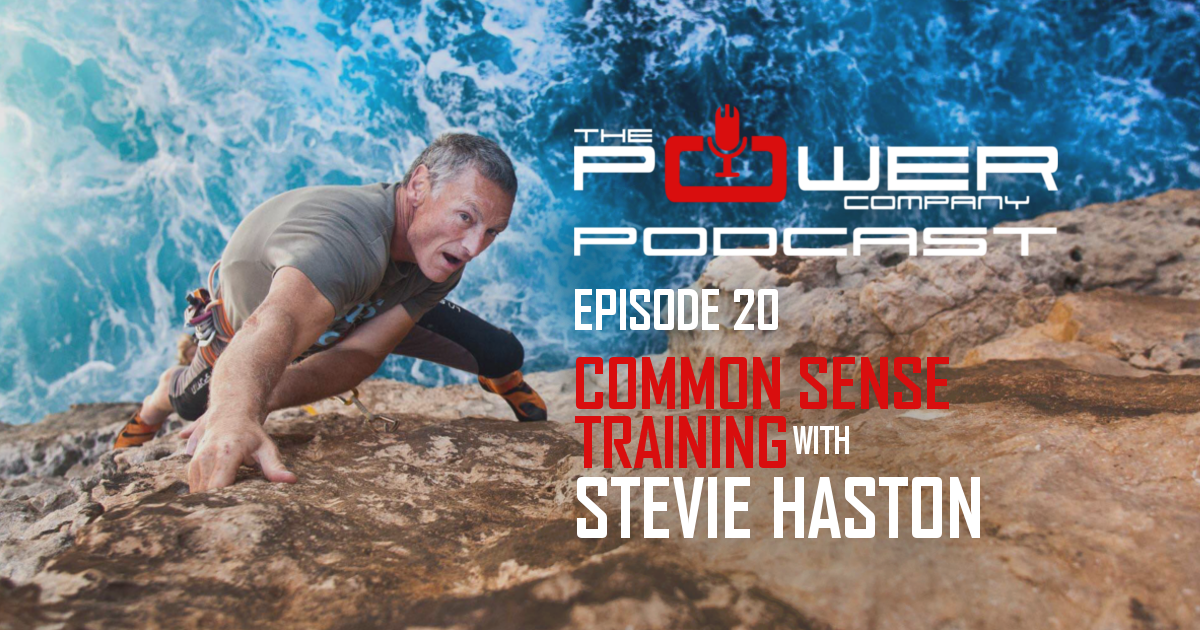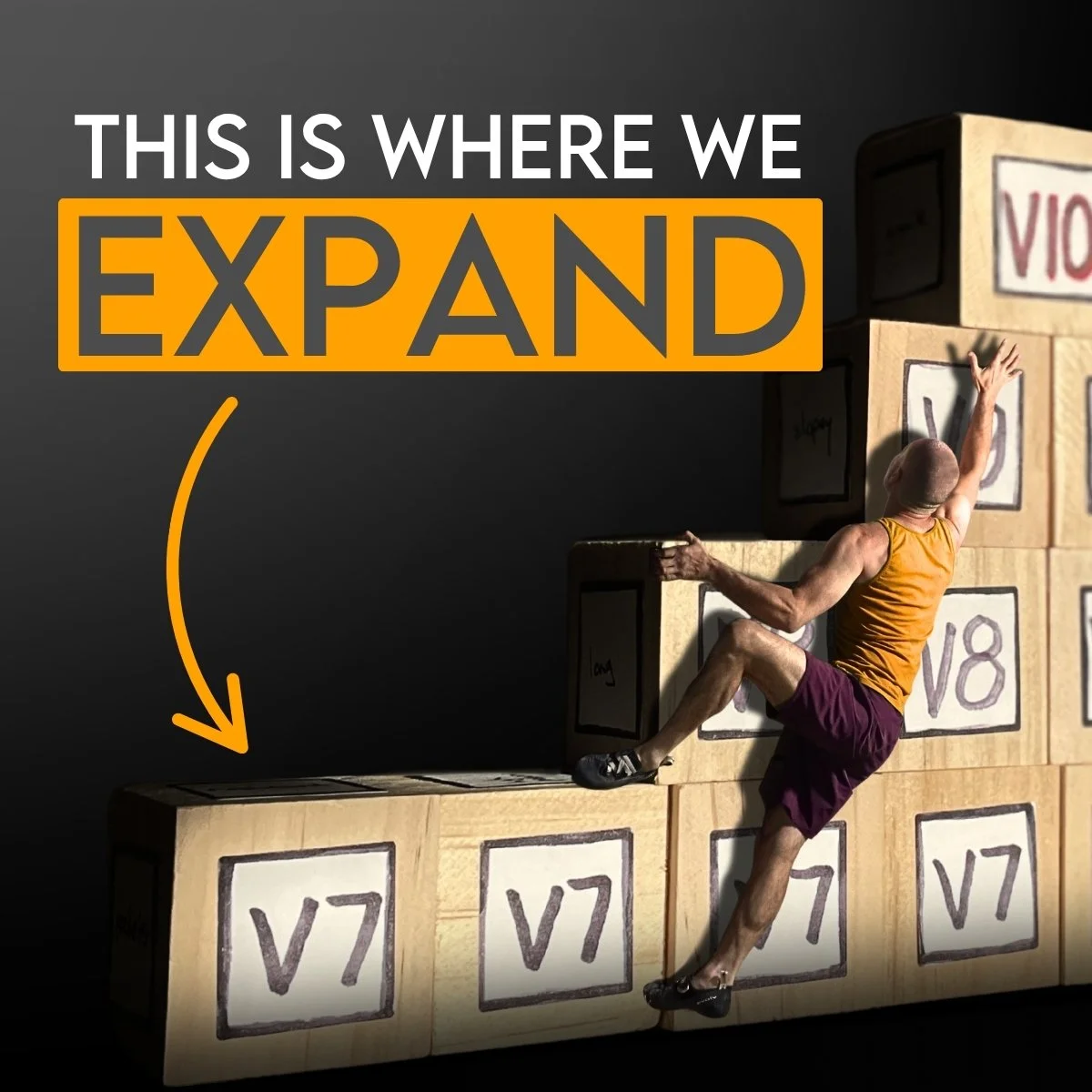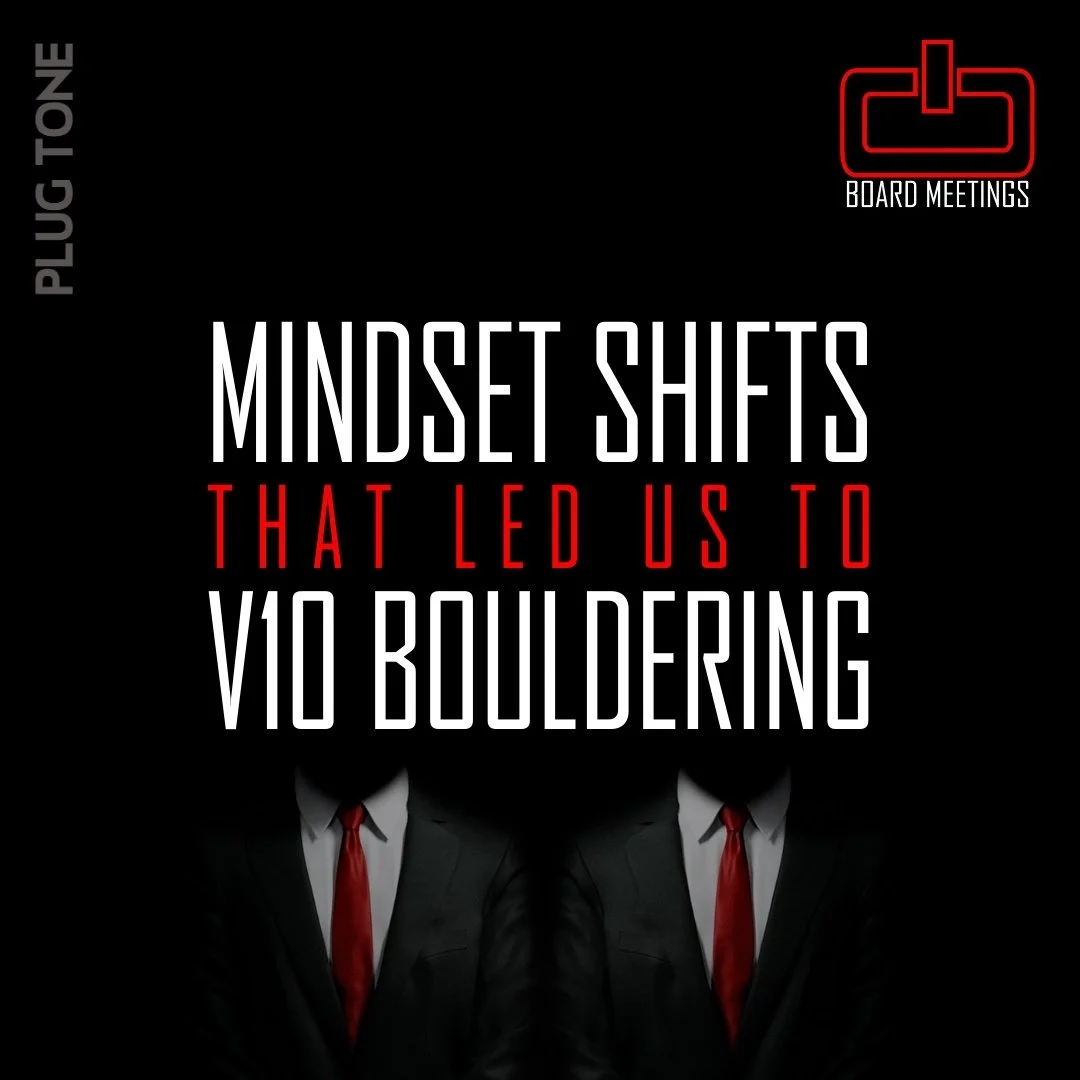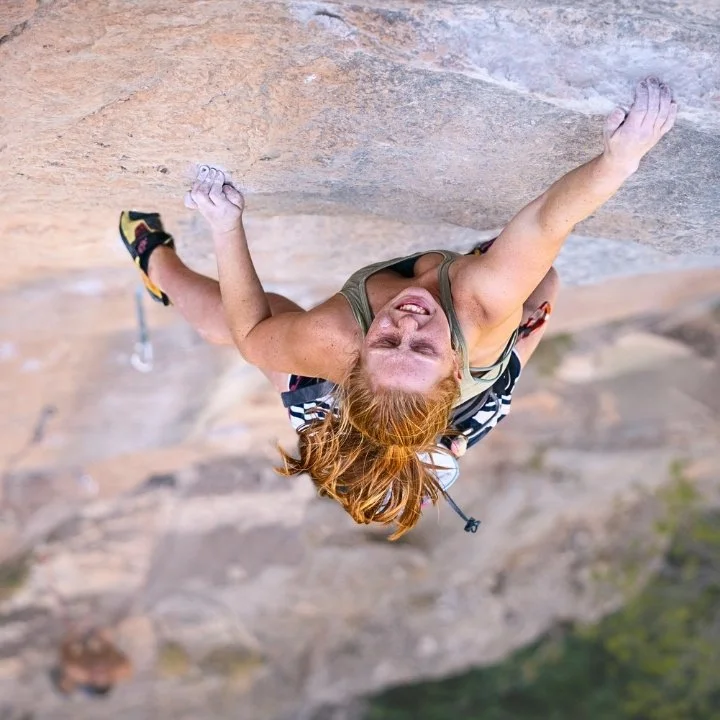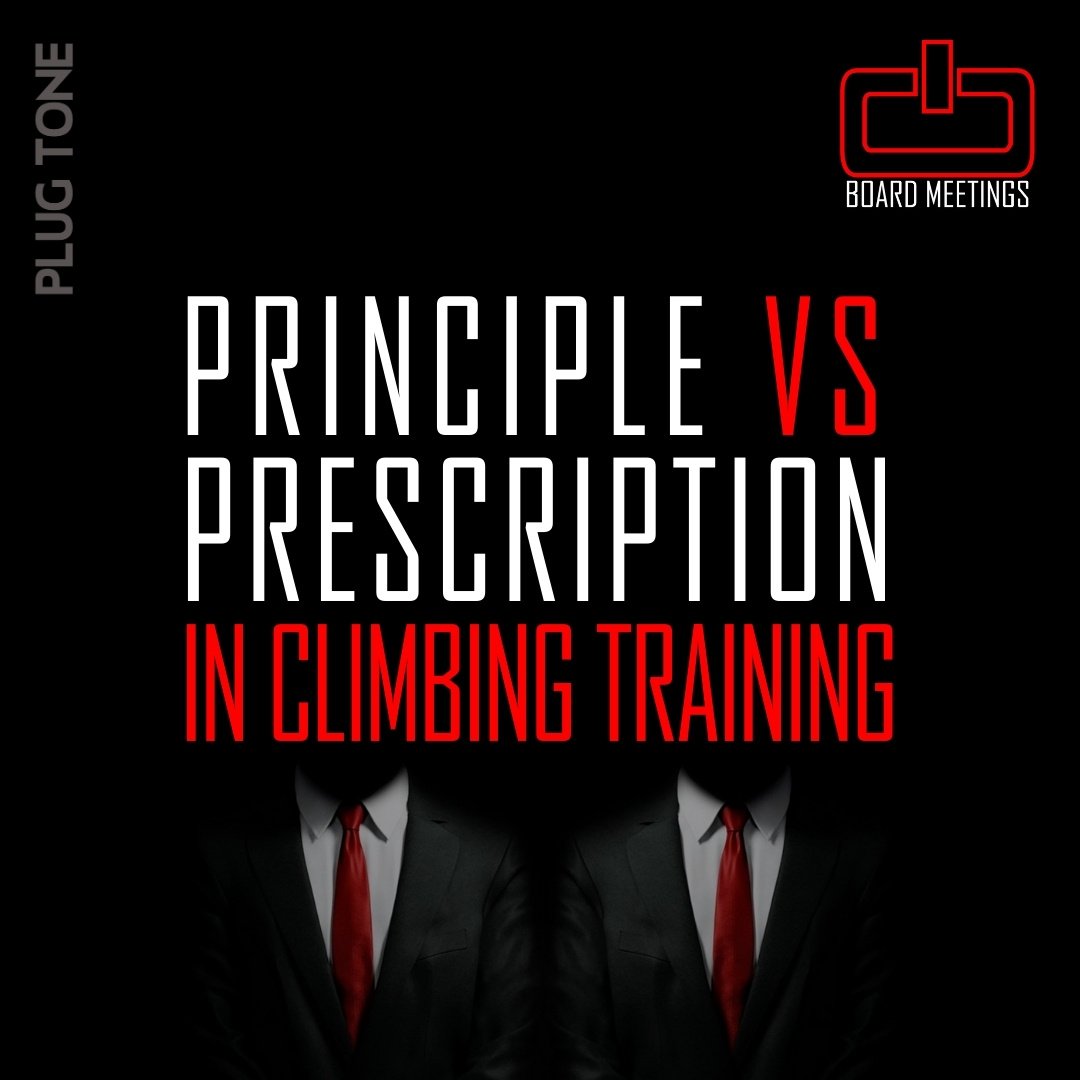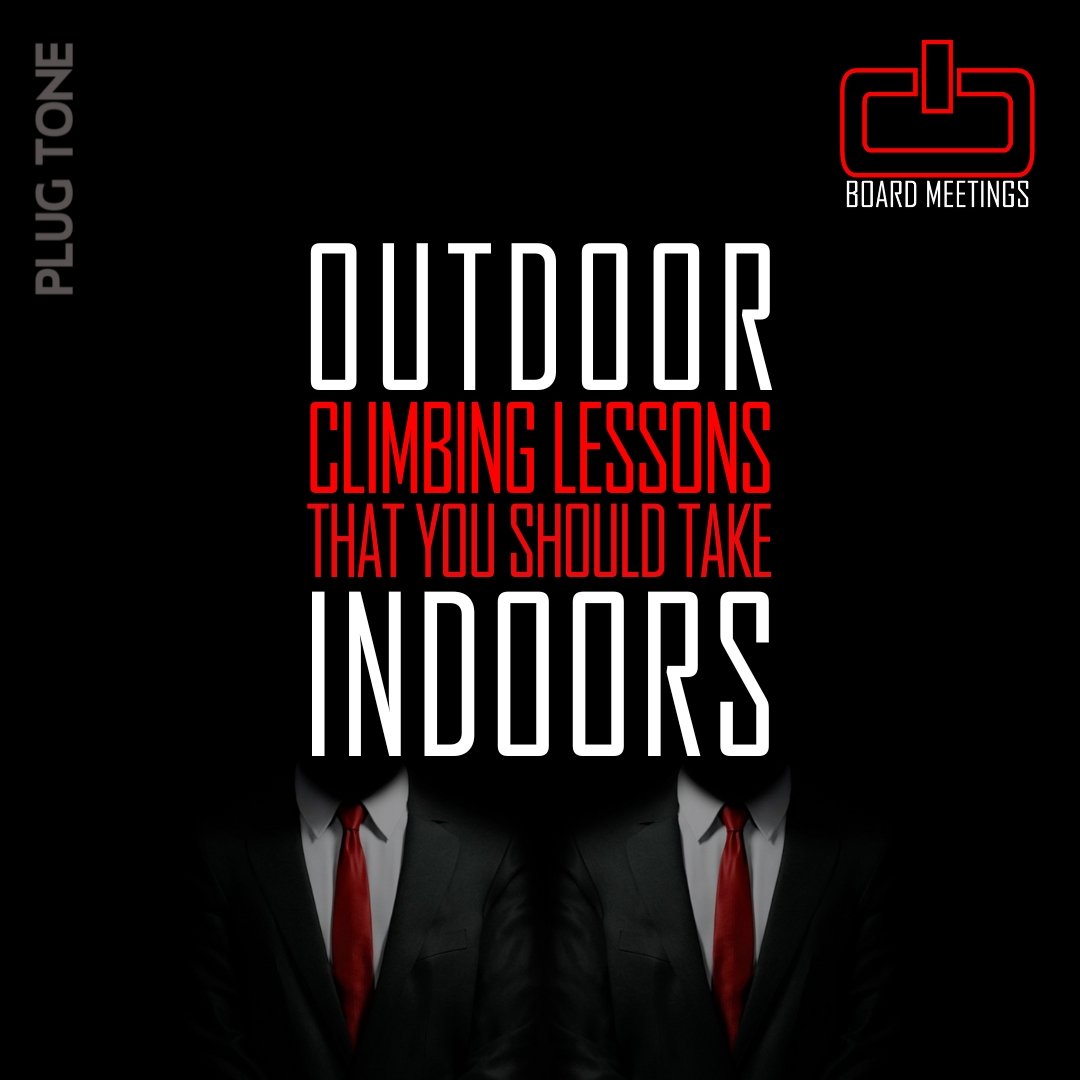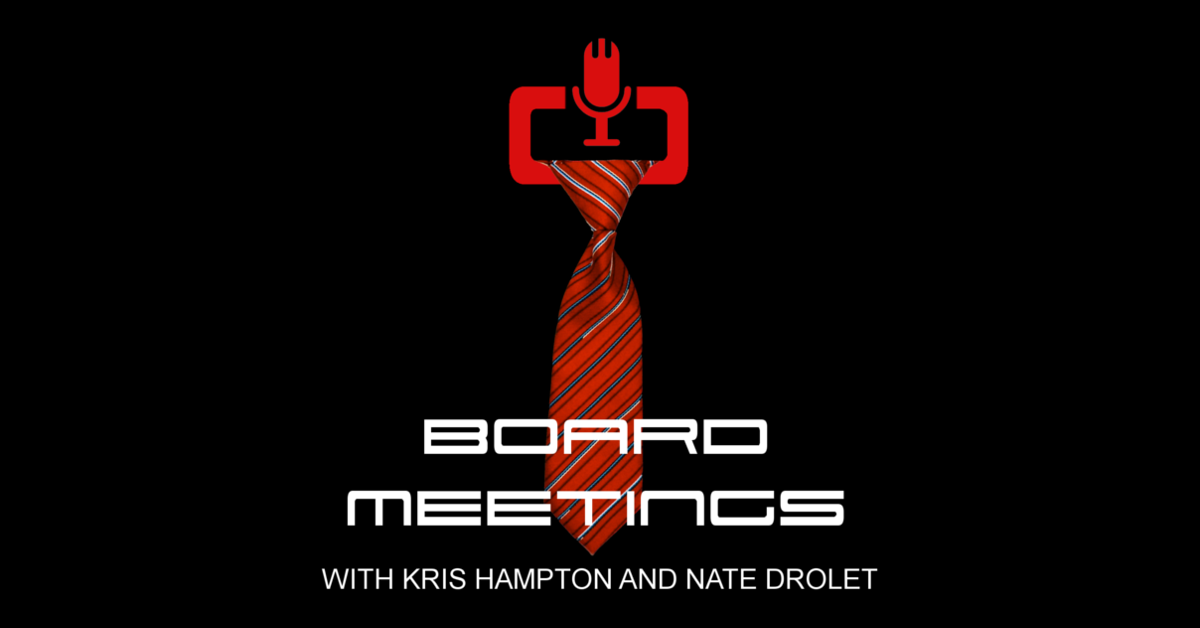Episode 20: Common Sense Training with Stevie Haston
LEGEND! Not much more needs to be said about this week's guest, Stevie Haston, but I'll say a few more things anyway. How does "flashed 14a trad" grab you? Or "14d in his mid-fifties"? I figured that would be enough to get your attention. Simply put, Stevie Haston is a machine. A simple, hard working, sensible machine.
I've admired the "Common Sense" approach that Stevie brings to his training for some time, and feel privileged to have been able to sit down with him at The Salt Palace in the middle of a busy Outdoor Retailer event. He's a no nonsense guy who is clear headed and appreciative about the life that he leads. A simple one. Imagine that.
You can learn more about Stevie's approach to training by checking out his blog at: www.steviehaston.blogspot.com Seriously, give it a read... it's one of the most entertaining blogs around.
Like what you hear? Subscribe to The Power Company Podcast on ITunes, Google Play, or Stitcher Radio, and leave a rating and review!
FULL EPISODE TRANSCRIPT:
Kris Hampton 00:31
What's up everybody? I'm your host Kris Hampton. Welcome to Episode 20 of the Power Company Podcast brought to you by powercompanyclimbing.com before I do anything, and I know I said this a couple of episodes ago, but I'm gonna say it again. Big, big huge shout out to our patrons, you guys helped us get to our first goal. And we are well on our way to our second goal which will allow us to purchase some equipment that we can take to the crags and get quick little interviews at the crags and you know, maybe do something cool with those. So big thanks to you guys. And if you want to become a patron, you can do that at patreon.com/powercompanypodcast, or go to our website and click on the podcast tab. And you can hook that up there as well. I am on my way to Chattanooga, from Red River Gorge we wrapped up our Red River leg of the trip and it was wild success all around. My fiance and I both wrapped up our goals into a neat little bow and feel good about moving on. So it's time to hunker down and and do some bouldering get actually strong instead of just good at paddling. Which is seems to be what the Red makes you actually I stuck to the, to the bouldering side of things this year, I stuck to some bouldery routes that I hadn't done before. And I'm pretty stoked about how that wen.t Anyway, when Chatty, the whole team will be meeting so it'll be Blake, Nate, myself and Paul. And we're gonna just do a bunch of roundtables and record some conversations and figure out some cool things for you guys. But that's not why you're here is it? You're here for Stevie Haston because Stevie is a bonafide legend and and I was I was really thankful for his time we sat down at OR this past summer and had a conversation inside Salt Palace. So you'll hear some people chatting the constant buzz of people talking about nothing, which is kind of what happens at o r most of the time. So ignore that. There's not a ton of it, but there is a little and yeah, Stevie Haskins legend, may be best known for climbing 14d in his mid 50s. But those are definitely not his biggest accomplishments. And I'll just let you search out Stevie Haston in your Googler because it can tell you a whole lot more than I can. And you should definitely check out his blog if you're interested in training or if this hits you in any certain way. his blog is steviehaston.blogspot.com. And it's filled with exactly what we're talking about here common sense training. And I had a tough time picking out the quote for for the beginning of this episode, because the whole interviews just quote worthy, so I'm just gonna let you check it out.
Stevie Haston 03:37
climbers realized that a long time ago, when you go on road trips, at the end of the road trip, you're weak. you're climbing one grade harder but you're weak.
Stevie Haston 04:05
You know, the block you get when when you redpointing you can't redpoint. Because you want to you want it so bad. I'm at that stage in my dive in I want to go deeper. And because my desire is so great, it's blocking me. It's making me tense.
Kris Hampton 04:18
And the consequences are a lot higher when you're diving, huh?
Stevie Haston 04:21
The consequences are fairly severe.
Kris Hampton 04:23
Yeah.
Stevie Haston 04:24
You can you know, you can die.
Kris Hampton 04:27
Yeah, that sounds terrifying.
Stevie Haston 04:29
It's in the competition's no one's died now for a few years. But if you were doing it by yourself, or you know spear fishermen they die. They die quite a lot. Okay.
Kris Hampton 04:40
Oh, man.
Stevie Haston 04:41
Yeah. Basically, it's like solo and if you go solo, and you stand a high chance of dying.
Kris Hampton 04:47
Yeah, if you keep pushing it.
Stevie Haston 04:49
Yeah. So normally you climb with a buddy and diving you climb with a buddy.
Kris Hampton 04:53
Yep.
Stevie Haston 04:54
So
Kris Hampton 04:55
So let's talk about your your philosophy for climbing training. That's what I'm really interested. And I've always been a big fan of your kind of keep it simple philosophy. That to me, if I had to sum it up seems like it's just, you know, hang from your fingers, lift heavy shit, stretch, sometimes get stronger sometimes lose weight.
Stevie Haston 05:16
Yeah, that's about it for me.
Kris Hampton 05:18
That's kind of how it's seems. Has it always been that way for you?
Stevie Haston 05:21
I was always very strong I've got very good genetics for strength. I'm I'm a very skillful person or also, it's not being big headed it's just I know that it's good to know your advantages, as well as your disadvantages. The philosophy of some of the parts of training have changed. And at the moment, people don't really know where they are. Because it's, it's thought now that a lot of climbing is much more skillful than we thought. And it's true, it is very skillful. So a large component of your training should be climbing.
Kris Hampton 06:02
Yeah, for sure.
Stevie Haston 06:03
But someone like me, and most people, they're going to get blocked very quickly, they're going to learn how to climb, they're going to get to 5.10 plus 11, low 11s very quickly, and they're just going to be blocked, and they'll be blocked by their fingers.
Kris Hampton 06:19
Right.
Stevie Haston 06:20
They'll be simply blocked by their fingers. And then you just got to go back, get stronger fingers. With that stronger fingers, you'll make another little progression, you'll have to learn a little bit more skill. And it just goes up like that. It's no good getting it all in one go. Because if you get it all in one go, the opposite happens. And you just start pulling like a lunatic and you forget about your feet.
Kris Hampton 06:43
And then you end up hurt.
Stevie Haston 06:44
Yeah.
Kris Hampton 06:45
Yeah.
Stevie Haston 06:46
You will end up hurt.
Kris Hampton 06:47
Do you, I'm... I know, it was an advantage to you that you've climbed. You've got a ton of experience climbing on different rock different areas. How important do you think that was to your early climbing as far as developing that skill that you talked about?
Stevie Haston 07:02
It was really, really important. You know, I learn a lot in North Wales where we have like, I don't know 7 kinds of rock within an hour's drive, right? And you know, on some you learn to pull like a maniac. There's cracks there. There's real hard slabs there on a peculiar rock called slate.
Kris Hampton 07:22
Slippery slabs.
Stevie Haston 07:23
Yes. slippery. And you know, you have to edge perfectly. So it gave me a huge depth of, you know, skill sets. So again, I had the skill sets, but then what's the missing element? The missing element is strength. It's stamina, is whatever that route requires.
Kris Hampton 07:45
And it's different for everybody. Right?
Stevie Haston 07:47
It is unfortunately, different for everybody. But you know, everybody then has to address this lack of whatever they've lacking in.
Kris Hampton 07:54
Yeah, for sure.
Stevie Haston 07:55
So they gotta get going.
Kris Hampton 07:57
Yep. It still has, how is your training changed? As you've gotten older? You're 50 what 59 I think, yeah, 59.
Kris Hampton 08:05
59. And you're still climbing, you know, the upper reaches of...
Stevie Haston 08:09
I'm climbing 14a, when I want, but I'm less powerful than I was a couple of years ago. But that's, it's by design, in some ways, because I don't need that power. If I went to France or Spain, I think I'd getting back. I make good job at it. Get it back in six months. Well, maybe it might take me a year, but I could get it back. You know, when I say a year people get frightened, don't they?
Kris Hampton 08:38
For sure.
Kris Hampton 08:39
That sounds like a long time to dedicate.
Stevie Haston 08:39
They want it...
Stevie Haston 08:40
Yeah. Sounds like a long time to most people. But for me, it's nothing.
Kris Hampton 08:44
Right.
Stevie Haston 08:44
I'll just get it back. I'll just train or disappear into my shed or wherever I've got. And I'll just train you. And I was quite shocked going to the Frankenjura you know, a year ago. How strenuous it was there. You know, you have to pull.
Kris Hampton 08:59
Yeah, on on little pockets.
Stevie Haston 09:01
On little pockets.
Kris Hampton 09:01
Yeah.
Stevie Haston 09:02
Little open handed pockets. And you know, you have to train for that aspect. If you go to Spain, you have to train some power, stamina. You know, it's not rocket science.
Kris Hampton 09:14
Yeah. So for you, it's just a kind of a constantly revolving thing. Like, I'll train up what I need for the next objective. And then I'll just keep going after that. Right.
Stevie Haston 09:22
Yeah, if you've... One of the things you know, is bit may be easier for me and a lot, a lot, a lot of others is that, you know, there's muscle memory. The more sports you've done as a young kid, you know, the more you're able to move. One of the things we're seeing at the moment, I think is a lot of girls being really good at climbing. And they've often got a small history in, you know, gymnastics, girl gymnastics.
Kris Hampton 09:48
Right.
Stevie Haston 09:48
It's really obvious when you watch him. And, you know, that's the side that the guys don't have.
Kris Hampton 09:57
Yep.
Stevie Haston 09:57
They just don't have it. And yet do they have adress this? Do they like sort themselves out? No, they continue to climb like men. They continue to climb like burly men.
Kris Hampton 10:07
Yep. I think it's trending more toward moving better.
Stevie Haston 10:10
Yeah, it is.
Kris Hampton 10:11
But it's definitely got a long way to go. You're right.
Stevie Haston 10:13
It's got a long way to go. And then if you watch a real master climb, climber my like, you know, Francois Legrand from France. He won numerous competitions. You know, he can still teach anyone, you know?
Kris Hampton 10:26
Yeah.
Stevie Haston 10:27
In fact that's that's what he is. He's the French team teacher.
Kris Hampton 10:30
Yep. Yeah. And he's a technician. Just a brilliant technician. Yeah,
Stevie Haston 10:33
He climbs so superbly.
Kris Hampton 10:35
Yeah. I use him as an example. When I'm talking to people about footwork, like, go online and look up. Francoise. Legrand and watch him climb. You know, it's so smooth. So technical.
Stevie Haston 10:47
Perfect. Yeah, he wasn't the strongest guy in our the shed. But he was, you know, he often got to the top.
Kris Hampton 10:56
Mm hmm. So since you, as you've aged, has the has the frequency of your training changed?
Stevie Haston 11:05
Are they there you go? That's an interesting thing, isn't it? Because how often do I train? I might train once every five days.
Kris Hampton 11:15
Mm Hmm.
Stevie Haston 11:16
I might, you know, I can still gain if I train once in six days.
Kris Hampton 11:21
Right.
Stevie Haston 11:22
Even though I'm a lucky genetic person. I don't think climbers rest enough. And they still make gains, but not muscular and strength ones because they're making gains at skill.
Kris Hampton 11:35
At skill, climbing skills, right.
Stevie Haston 11:37
The more skillful they are, the more you know, the less force they have to use. But they're getting weaker. Some of the time, they're actually getting weaker. They're succeeding on the problems, but they're getting weaker. And a lot of us old timers realized that a long time ago, when you go on road trips, at the end of the road trip, you're weak.
Kris Hampton 11:57
Right.
Stevie Haston 11:57
You're climbing one grade harder, but you're weak.
Kris Hampton 12:00
Yep.
Stevie Haston 12:01
And if this goes on for too long, you know, you'll go back backwards?
Kris Hampton 12:05
Do you have a way to gauge that? Or is it just you can feel it you just know it?
Stevie Haston 12:09
In in the old days, I would take a fingerboard around with me. And some weights, and I had very specific, you know, scores to reach.
Kris Hampton 12:19
Right.
Stevie Haston 12:19
And I would know, I was going backwards, or, you know, just staying, you know, where I was?
Kris Hampton 12:24
Yeah, interesting.
Stevie Haston 12:25
And I used to weigh myself, you know, every two days.
Kris Hampton 12:28
And when you come back to your home area, could you tell the difference?
Kris Hampton 12:32
I would have certain you know, like when I lived in France, I six, you know, pull up boards, and I knew exactly where I was on each hold.
Kris Hampton 12:40
Right. So you had standard metrics that you can always came back to? Yeah, if I can't do these, I need to get stronger again.
Stevie Haston 12:47
How many one arms can I do on what you know, the left? How many one arms can I do on the right? How long can I hold the front lever for I had it all written down. And I'm not like a write you down kind of person.
Kris Hampton 12:58
Yeah.
Stevie Haston 12:58
But I had all of these things written down. You know?
Kris Hampton 13:00
Yeah, that's good to do. I'm not either I don't keep nearly as as good notes in as good of track as I should. But I do I do have some of those metrics. And I do know where I should be. So..
Stevie Haston 13:11
That's it.
Kris Hampton 13:12
That's important to have.
Stevie Haston 13:12
You should know.
Kris Hampton 13:13
Yep.
Stevie Haston 13:14
You should know, the maximums and then you should look at some other people, some of your friends and and try and judge them too.
Kris Hampton 13:22
Yeah, for sure.
Stevie Haston 13:23
See how strong they are exactly. I go into a loaded trouble. You know, a couple of years ago when I interviewed Mr. Ondra. Young, Mr. Ondra. And I said he was really weak.
Kris Hampton 13:34
Yeah. And I think you're right.
Stevie Haston 13:35
He was weak. He's, he's a lot stronger now. But that guy was so much weaker than most of my friends and myself.
Kris Hampton 13:43
But his skill level and his speed was so high.
Stevie Haston 13:46
Yeah.
Kris Hampton 13:47
Yeah. I mean, he's still a genius. That boy.
Kris Hampton 13:49
Yeah, for sure.
Stevie Haston 13:49
That young men now.
Kris Hampton 13:51
Yeah. And I think that's important to be able to recognize those weaknesses. And even the strongest climbers, you know, it's important for everyone to see that. Adam Ondra has, you know, he's got a soft spot. He's got a weakness.
Stevie Haston 14:03
Yeah, which he's addressing.
Kris Hampton 14:04
And he's addressing now.
Stevie Haston 14:05
He's really is addressing it, and he's got stronger, and he will do 9c. Yep, he will break that magic barrier I think. He's trying to at the moment, and we'll see anyway,
Kris Hampton 14:16
Do you ever look at the science of training, and then just do you distill it down? Or do you just ignore it? Or how do you keep this simple philosophy with things constantly changing?
Stevie Haston 14:30
I've got a very long history in sport. I was a runner when I was a kid. And I go into a lot of trouble with my running training, because all the running protocols and all of the sport protocols are based on people who take drugs.
Kris Hampton 14:44
Right.
Stevie Haston 14:45
And..
Kris Hampton 14:46
That's a good point.
Stevie Haston 14:47
Yeah, and this is what most sports men don't understand. If you're really really good at a sport, it means you're chemically enhanced. If you're chemically enhanced, you don't need very much rest or recooperation.
Kris Hampton 15:00
Right, and then all those numbers are skewed.
Stevie Haston 15:02
Yeah, everything is really, really wrong. Yep. And that's why I didn't become the runner that I wanted to become. Because they have you running quite serious amounts of running on days, you should be flat on your back.
Kris Hampton 15:17
Right? Sure.
Stevie Haston 15:18
Yes.
Kris Hampton 15:19
And back to your rest is your most important part.
Stevie Haston 15:22
How can you get better if you can't grow in those or regenerate? And if you look at running protocols today, you'll know that there's something really, really wrong with them.
Kris Hampton 15:33
Yep. And what about I mean, climbing training is kind of it's it's very, very young, still very dumb compared to a lot of a lot of training. And, but it is growing. And there are there is research being done.
Stevie Haston 15:49
There's a lot of research being done on the quiet. Yeah.
Kris Hampton 15:51
Yeah. Are you paying any attention to that stuff?
Stevie Haston 15:53
Yeah, it gets sent into the, into me by my friends. And, you know, I try and keep up with it. But it's, it's hard to, to tell whether a lot of it's effective, because then you'd have to do you know, what they're telling you to do? And that would take a long time.
Kris Hampton 16:08
Yeah.
Stevie Haston 16:09
Whereas what I do, always works for me.
Kris Hampton 16:12
And I, you know, I think if you read that research, and and really try to distill it down, it almost always leads you back to the simple things that are part of your philosophy.
Stevie Haston 16:23
Yeah. And they tell you to rest. And then the guys that do those programs, they won't rest. They'll disobey what what's being said. And so this is, when you look at people who train now, there's a lot of success from people who have been trained. And it's because they need to obey. They need to obey, you know, the rest, the rest cycles, yeah, left to their own devices, they won't rest.
Kris Hampton 16:51
Yeah, it's really hard to make climbers rest.
Stevie Haston 16:53
Yeah.
Kris Hampton 16:54
I mean, we love this. We love climbing. So
Stevie Haston 16:56
Yeah, it's great.
Kris Hampton 16:56
We want to do it all the time.
Stevie Haston 16:58
Climbing is great. But if you do it all the time, you won't succeed all the time. So you've seen a lot of success with trainers and kind of climbers are a bit more controlled by another person. And that's the normal way in sport.
Kris Hampton 17:13
Yeah.
Stevie Haston 17:14
You know.
Kris Hampton 17:15
Have you followed down any paths of, you know, trying some new training that that didn't work out that?
Stevie Haston 17:22
Yeah I have.
Kris Hampton 17:23
And you're hiking it out entirely?
Stevie Haston 17:24
Lots and lots of times I've trained in the wrong way. You know, one of the big problems on routes is, you know, like power, stamina or just, it's kind of stamina, really, at a high level, and it might be the trickiest area of climbing, you know, someone genetically gifted, the strength won't be a problem.
Kris Hampton 17:45
Right.
Stevie Haston 17:46
But that power, stamina element, is really what kind of typifies a lot of routes. It's um...
Kris Hampton 17:56
It's often the failure point for people.
Stevie Haston 17:58
Ceuse, you know, 30 meter pitches in a pretty hard for like, 20 meters, or 25 meters. It's like, it's a killer. It's really hard to train for, really hard to train for. That's where I've failed tons and tons of times.
Kris Hampton 18:17
Yeah. And I think there's a mental component to that kind of training, like we were just talking about with diving, it's hard for you to learn the relaxation, when you're diving, but you're really good at it with climbing.
Stevie Haston 18:28
Yeah, I am very good at a climbing and diving i'm absolute rubbish.
Kris Hampton 18:32
But was it always that way with climbing? Were you just naturally good at it?
Stevie Haston 18:36
No, I had to make it less important. And I'm a very passionate person, the more the more you want something, the less you're going to be able to get it. It just tightens up your mind. The more pressure you put on your mind, the more it's not in control of your body, you know, you need you need to be halfway in your mind has to be relaxed. Otherwise, it just tenses up. And it slows everything down. The movements have to be subconscious. And the more stress you put on yourself, the less subconscious they become.
Kris Hampton 19:12
Right.
Stevie Haston 19:13
And everything just gets really screwed up.
Kris Hampton 19:16
Yeah. Was Was there anything that you did that help that process along? Or was it just the experience?
Stevie Haston 19:22
I used to climb a lot and I used to climb with people who were better than me. And clearly they did the job they had to do is less because they were better than me. But I realized that for me, I just run through the moves or, you know, think some nice thoughts. Slow might you know, disengage my brain.
Kris Hampton 19:39
Right.
Stevie Haston 19:40
It's just normal relaxation, normal yoga.
Kris Hampton 19:43
Yeah, I like that. I think that climbing with people who are better than you is huge, because you kind of there's a new paradigm. You know, you start to feel like oh, maybe this grade isn't this crazy hard thing that I thought it was?
Stevie Haston 19:57
Yeah. Then again, you're setting up. You're setting up climbs on a pedestal where you're saying that they're really difficult. That's not what you want to do.
Stevie Haston 20:04
Right.
Stevie Haston 20:04
It. It's almost a kind of self delusion, you know, you have to say that they're not hard. But then after they take your 10 days and you still haven't gone anywhere, then you know, you're creating a problem for yourself. You've probably overreached, you know, your ability and time to bring your aspirations down to a more sensible level.
Kris Hampton 20:27
How much do you think your general lifestyle plays into you're still being able to climb at a high level, still being able to, you know, perform in any sport at a high level at 59?
Stevie Haston 20:41
It's came more interesting, because some people are they look to me, and they go, Well, you know, Stevie can do it, I can do it and that's really helped. If you look at Ben Moon, Ben moon just did a right9a at 49. And In I did one at 50, I did one at 55 years old. We kind of realizing that a lot more is possible than we realized. And we don't know where these kind of limits are now. We don't.
Kris Hampton 21:09
That's good.
Stevie Haston 21:09
But and my lifestyle is all its, it's built around me enjoying my body in sport. I don't work very much. And, you know, it's bit haphazard my life. But at the end of the day, I don't want to work. I want to do my sport.
Kris Hampton 21:30
Yeah.
Stevie Haston 21:30
I want a little bit of money. To do my sport, I want to go climbing, I want to swim, I want to do you know, a bit of a trail running when I when I'm in the right place.
Kris Hampton 21:41
Right and you've cultivated that over years.
Stevie Haston 21:43
I've been doing that all my life.
Kris Hampton 21:45
Right.
Stevie Haston 21:45
All my life. And that some other some other lucky people have to you know, if you live in a nice place, you know, Boulder, Salt Lake City, you can have a lot of those things too.
Kris Hampton 21:56
While still working. And yeah, you know, while living the normal grind.
Stevie Haston 22:01
Yeah. You know, nine to five, rather. And you can still do it in Salt Lake or Boulder.
Kris Hampton 22:07
Yeah. Is there anything that you think is particularly important? Other than rest that we already talked about for the aging?
Stevie Haston 22:17
Yeah, there's a few areas where you can get a couple of percent, you know, yoga is important to me, but you know, some kind of form of stretching is very important for people. You can get in maybe at least 5% more out of your climbing, nutrition is the same. It's more important. If you've got really lousy nutrition, if you eat really bad, you'll get better by eating really well. And you know, then you have to seriously look at your weight. You have to be brutal about how heavy you are. You have to be brutal about how masculine you want to look.
Kris Hampton 22:57
Yeah.
Stevie Haston 22:58
Men have got real hang up about you know, like looking like a man. You don't really want to look like a burly man if you're a climber.
Kris Hampton 23:07
Right.
Stevie Haston 23:08
And that's a big barrier to a lot of men. And girls have a similar barrier. They don't want to look, you know, burly, but I happen to think that a strong looking rock climbing girl is very attractive.
Kris Hampton 23:21
Yeah, no doubt.
Stevie Haston 23:22
And, you know, one of my problems was I was a very masculine guy, and I wanted to look like a man, you know.
Kris Hampton 23:29
Your kind of a burly build anyway.
Stevie Haston 23:31
My backgrounds, you know, in the Mediterranean, you know, we're macho and all of this. And I realized very early on climbing France, that it wasn't the kind of the UK look as well, you know, power thing. It was more of a sustained, clever stamina climber that got up the routes. Anyway, so we got, you know, yoga or stretching, we got nutrition. And like that don't drink alcohol there's another 5%. Yeah. You know, alcohol is great, but it will seriously screw up. You know, how you take in nutrients.
Kris Hampton 24:06
It's hard to stick to stick to those things.
Stevie Haston 24:09
It's very hard. But if you want the results you have to do so you get a few percent from each adds up to quite a result.
Kris Hampton 24:15
Yeah.
Stevie Haston 24:16
Then after you get your good result, your good redpoint or your good holiday. Have a few drinks. You know, relax. You know.
Kris Hampton 24:24
Yeah. All things in moderation is kind of what you're saying.
Stevie Haston 24:27
Yeah, but if you really want a good result, you it's not moderation you have to...
Kris Hampton 24:31
hammer in on it.
Stevie Haston 24:32
Yeah. Hammer, zero in on your weight. You know, look at it be ruthless. But you don't have to be ruthless. If you stay at a really low weight. You're gonna screw your body up.
Kris Hampton 24:42
Yep.
Stevie Haston 24:42
Stay light for one month maximum.
Kris Hampton 24:44
That's it. You said something really interesting. In a blog a while back about sometimes you want to lose weight. Sometimes you want to be stronger and there are different routes that require different things. You know, what's your what's your take?
Stevie Haston 25:00
Well, if you're trying to, you know, make muscle, which very few people need to do, you have to slow your metabolism down. It's just a physical, physiological thing. You need to eat food. And you need to slow everything down. And I think a lot of climbers find that hard because they're, they're not like that they want to climb every day. Yeah, but if you want to build some muscle up, you have to slow everything down. And, but, when you want to lose weight, you want to maybe build build, your metabolism up, be a bit faster. And that means a lot of climbing too. You can do it by a lot of climbing.
Kris Hampton 25:42
Is there a particular kind of route where you think you you want more muscle? You want to be stronger?
Stevie Haston 25:48
It would be power climbing like Frankenjura, or, you know, big caves. Like where I used to hang out.
Kris Hampton 25:53
Right. Big steep pulls on things.
Stevie Haston 25:55
Yeah, you know, if you can't do a one arm front lever and stuff like that, you have to be really gifted, like Ondra or someone. Some of my mates are very, very good. But most of my mates who climb Font, you know, Font 8b, they can all do one arms.
Kris Hampton 26:12
Right.
Stevie Haston 26:12
Yeah. It's just that kind of small level of strength.
Kris Hampton 26:15
Yep.
Stevie Haston 26:16
That's That's it. The little girl from Colorado. She can do three one armers.
Kris Hampton 26:22
Alex Puccio?
Stevie Haston 26:24
She's a strong little girl, isn't she?
Kris Hampton 26:25
Yeah she is.
Stevie Haston 26:26
She can do a little front levers and a one arms. Yep. Well, you know, for me, that's the kind of that's a minimum level of power.
Kris Hampton 26:34
You think you should train to do those one arms or it doesn't come along with getting stronger for climbing.
Stevie Haston 26:40
Some of my mates got to one arm is just by climbing in the Frankenjura for like, you know, a couple of seasons, I guess they might have been gifted, I trained for one armers when I wish I could train for when I was when I was 14.
Kris Hampton 26:53
And you felt like it transferred over to your climbing pretty well?
Stevie Haston 26:56
It didn't immediately because in some ways, it may made me climb better. But my footwork wasn't in step with my power.
Kris Hampton 27:06
Gotcha.
Stevie Haston 27:06
But it meant that my power was always there. So when I did find my technique, eventually, everything did come together.
Kris Hampton 27:14
Yep, as long as you're looking for it, I think you have to lood for it.
Stevie Haston 27:17
You have to stay on top of it. You know, power is ruthless. It's ruthless. You know, you don't. You don't want to let it be in control of you. You want to be in control of your feet. That's what you want to be in control of. Yeah, you want to be in control of you panic, you know, you panic.
Kris Hampton 27:34
And I think Chris Sharma is a good example of that. When he was younger, it certainly looked like his power was in control to him.
Stevie Haston 27:39
Yeah
Kris Hampton 27:39
But he's grown into it now.
Stevie Haston 27:41
He's become a better climber. Run much better climber. He used to get up things on strength and tenacity and willpower. And, you know, in the last few years, he's been getting up things on a lot of skill. A lot of skill.
Kris Hampton 27:58
I know you're not in your, in your climbing season in Malta right now. It's mostly diving. And that's what you're psyched to be doing right now. Do you have other goals? for climbing?
Stevie Haston 28:09
Yes. Next year, I want to climb 5.14b. It's just it's not just a number. It's just think I should do when I'm 60. And I've got a couple of climbs on my island. Not a couple I've got, you know, hundreds of new routes to do.
Kris Hampton 28:26
Yeah.
Stevie Haston 28:27
And some of them will require a lot of power, stamina, you know, 50 meter pitches. Very like Ceuse. And I've been frightened of opening a couple of the cliffs there, because I really hate training for that kind of route. But now I think, okay, I'll just train for those routes. And, you know, see what happens.
Kris Hampton 28:50
Yeah, well that's great. Yeah, and I appreciate the I appreciate your simple approach. And it's, it's been great for me, because I can get caught up in the minutiae and the science of it and, and want to start changing little things. But it's really great for me to come back to your blog and just go Alright, I just need to keep it simple.
Stevie Haston 29:12
Yeah.
Kris Hampton 29:13
That's what it all comes back to anyway eventually.
Stevie Haston 29:15
One of the simple things is just having good habits, you know, train three times a week. Don't worry about it too much. You know, have a good time train three times a week, train twice a week. But train.
Kris Hampton 29:29
Yeah.
Stevie Haston 29:29
You know, train.
Kris Hampton 29:30
Yeah, I thinnk...
Stevie Haston 29:32
You don't have to hang on those little ledges for precisely, you know, seven to eight seconds. You don't.
Kris Hampton 29:38
Right.
Stevie Haston 29:38
You don't. Those kind of protocols don't mean anything. But train your fingers. Make sure you kind of around the right mark. There's overtraining under training. You know, if you're going to do a marathon, you don't have to do a marathon every day.
Kris Hampton 29:55
Right? Sure.
Stevie Haston 29:56
You know.
Kris Hampton 29:56
You need to train the components of the marathon.
Stevie Haston 29:59
The components of it. If you train a marathon every day, you'd be dead. You know?
Kris Hampton 30:03
You'll never get to the actual marathon.
Stevie Haston 30:04
No.
Kris Hampton 30:07
All right, well, man, I appreciate you taking time out. I know it's crazy here at OR so.
Stevie Haston 30:11
It's crazy. It's motivating also, cuz you see all these great people?
Kris Hampton 30:15
Yeah.
Stevie Haston 30:15
I just saw Lynn Hill. She looks great.
Kris Hampton 30:18
Yeah.
Stevie Haston 30:18
You know, she's, I won't say Oh, because she's obviously 21 years old. She's an inspiration.
Kris Hampton 30:24
Eternally 21?
Stevie Haston 30:25
Yeah. You see Chris Sharma. You see Stefan Glowacz.
Kris Hampton 30:29
Yeah, I saw you were hanging out with both those guys the other day.
Stevie Haston 30:32
Yeah. You know, those two guys really inspire me, you know?
Kris Hampton 30:35
Yeah.
Stevie Haston 30:35
I was talking to Stefan. Stefan is one of the great European heroes. You know, we're talking about an older guy called Bernd Arnold.
Kris Hampton 30:43
Oh, yeah. From the Frankenjura right?
Stevie Haston 30:45
He's this German guy. And he was, you know, inspiration for me and Stefan.
Kris Hampton 30:50
Is he from the Frankejura or?
Stevie Haston 30:51
No, he's from Dresden. Elven sandstone.
Kris Hampton 30:54
Right. Exactly.
Stevie Haston 30:55
My last route it was named after him. It was called Bernd.
Kris Hampton 30:58
Oh, I saw that.
Stevie Haston 30:59
Yeah. And so you go into Bernd,s old house in east Germany what do you see? You see fingerboards.
Kris Hampton 31:06
Right.
Stevie Haston 31:08
You know.
Kris Hampton 31:08
Strong fingers.
Stevie Haston 31:09
35 year old 40 year old fingerboard. Okay. It's not an accident that Bernd was a good climber.
Kris Hampton 31:18
Right? He doesn't need to have pulleys and timers and all those things.
Stevie Haston 31:21
He just used to hanging out there.
Kris Hampton 31:23
Hangs on his fingers.
Stevie Haston 31:24
Yeah.
Kris Hampton 31:24
And gets strong.
Stevie Haston 31:25
Yeah.
Kris Hampton 31:26
Yeah.
Stevie Haston 31:26
He lives in a great place. You know, it cliffs around him. So that was it.
Kris Hampton 31:30
Yeah. Cool. All right, man. Thanks for sitting down. I really, really appreciate it.
Stevie Haston 31:35
A pleasure, man. pleasure.
Kris Hampton 31:37
Thanks, Stevie.
Kris Hampton 31:38
You feel the tear your cheeks getting hot. And that stings that little sting. That's because the aspirin is blunt. And we're talking directly to you. And me, too. I needed sometimes as well. I like to go to Stevie's blog and get a dose of keep it simple fucker. Because we'd like to complicate shit. All these complicated reps and schemes and everything else we do aren't always necessary. So keep that in mind. Keep it simple. It's a good way to approach things. And definitely check out Stevie at his blog steviehaston.blogspot.com. Reach out to him with any questions you have. He's a great dude. And big thanks to Stevie for sitting down with me. I really, really appreciate it. Okay, I got to get onto the road. Get the rest of the way to Chattanooga. So we can get this thing going. If you guys want to help out, you can do that. We have T shirts available on the site. Now pick those up for stocking stuffers for your your favorite climbing partner, let them rep your favorite training company. Why wouldn't you do that? And also become a patron you can do that at patreon.com/powercompanypodcast. What that does is help us keep this thing commercial and sponsor free and it's going to help us grow it. We're really excited about that. And maybe the best thing you can do is share us on your social medias. You can find us on the Facebook's the Instagrams, the Pinterest. And you can share us on your Twitter. But we don't tweet, we scream like eagles

